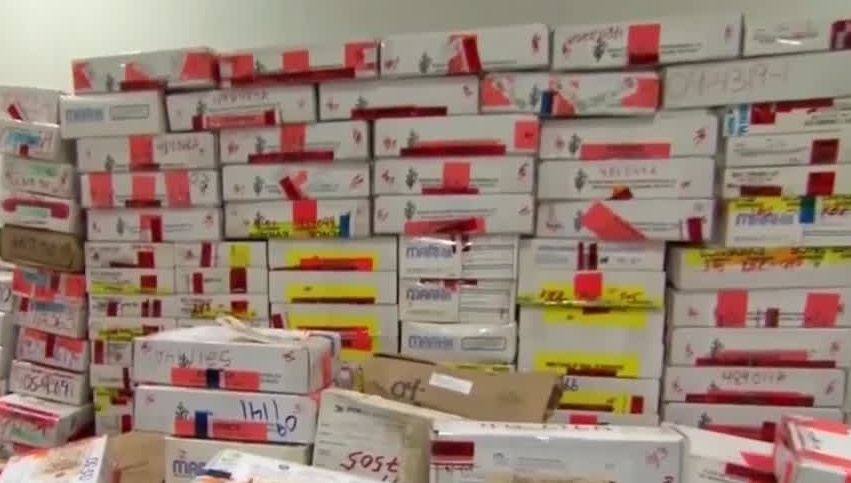AG finds 5,000-plus untested sexual assault evidence kits, gets grant for backlog analysis
Attorney general's office has received a $2.8 million Sexual Assault Kit Initiative grant from the U.S. Department of Justice to process untested evidence
October 1, 2018
At least 5,424 sexual assault evidence "kits" remain untested in Missouri, according to final numbers from the attorney general's statewide audit released Monday. In May, the preliminary audit found 4,889 untested kits, according to previous Missourian reporting.
Meanwhile, the attorney general's office has received a $2.8 million Sexual Assault Kit Initiative grant from the U.S. Department of Justice to process untested evidence, create a tracking system, complete the inventory of untested "kits," and standardize collection protocols.
Law enforcement agencies, health care providers and crime labs were asked to provide information to the office voluntarily. The response rate was around 57 percent with 372 police departments responding out of a total 655 law enforcement agencies in Missouri. Eighty-seven health care providers and five crime labs also responded to the office's request for information.
How did Columbia agencies respond?Some agencies that responded to the attorney general's survey didn't provide the number of untested kits in their custody, including the Boone County Sheriff's Department. That agency responded that it couldn't determine the number because it wasn't able to search its "archaic" records management system, according to records from the attorney general's office obtained by the Missourian.
In answer to the survey's question asking for common reasons why evidence would not be submitted for testing, the department wrote: "Victim non-cooperation, victim not credible or no apparent crime committed."
Law enforcement agencies need to submit all sexual assault evidence kits for analysis and should actively investigate the case regardless of the status of the victim, according to the recommended best practices for sexual assault kits established by the U.S. Department of Justice.
In the Missourian investigation that prompted the attorney general's audit in November 2017, the department said the kits could be counted manually but that there was no way to do so through its records management system. Major Tom Reddin said his agency stores a number of unprocessed kits.
"I have no idea how many kits we have, but it's a lot," he told the Missourian.
MU Police said it has two untested kits, according to the same records obtained by the Missourian. In October 2017, the Columbia Police Department said it had at least 87 untested kits, but the attorney general's office said it couldn't provide any data from its audit regarding that agency.
Boone Hospital Center does not hold or collect sexual assault evidence kits as they refer victims to MU Health Care instead. MU Health Care holds 91 untested kits, but 40 kits "belong to patients that, at the time of evidence collection, did not consent for their kit to be turned over to law enforcement," according to the attorney general's records.
If the victim doesn't want to report the crime to police, MU Health Care will keep the kit for one year, but the hospital's response didn't specify what happens to the evidence after that time. The victim will be notified if the kit is destroyed, according to the records.
Evidence should not be stored at a hospital and should instead be given to law enforcement, according to the Department of Justice guidelines. But without consistent guidelines and cooperation with law enforcement statewide, hospitals are often left to make up their own policies, according to previous Missourian reporting.
How will the office use the grant?The grant will first fund the completion of the inventory of untested kits. Once the state has a more complete count of the unprocessed evidence, the grant will pay for those kits to be processed by private forensic labs. It will also support the state's initiative to standardize the collection, retention and testing of sexual assault evidence throughout Missouri.
Last spring, legislation was passed that requires implementation of an electronic evidence tracking system. The grant will help the office create such a system for survivors and law enforcement to follow sexual assault evidence from collection through possible use in a criminal trial. For the first time, survivors will be able to view the status of their evidence, and it will be possible to track the number of untested kits automatically.
"To undergo a sexual assault evidence examination is a brave act," Attorney General Josh Hawley said in the release. "No kit should languish untested when its collection requires such courage. My hope is that this grant funding will allow Missouri to test all existing kits and to establish statewide protocols that will prevent any kit from going untested in the future."
The office has also assembled a working group to develop the tracking system and standards for collecting and processing of sexual assault evidence. Among the members are the Missouri State Highway Patrol Crime Laboratory Division, Missouri Coalition Against Domestic and Sexual Violence, Missouri Office of Prosecutorial Services, Missouri Hospital Association, St. Louis University Hospital, Mercy Hospital, Springfield Police Department, county prosecutors, victim advocates and the Missouri Attorney General's Office.




